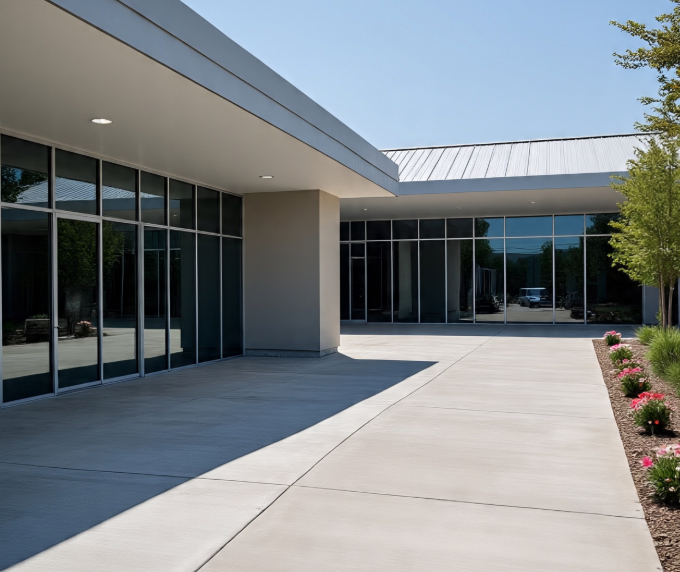Your driveway endures constant pressure from vehicles, weather, and seasonal freeze-thaw cycles that cause damage. Professional concrete driveway repair GTA specialists use proven techniques to restore structural integrity and appearance. These expert methods can extend your driveway’s life while preventing costly complete replacement projects.
Common Driveway Problems and Causes
Cracks develop from ground settling, temperature changes, and heavy vehicle loads over time. Small hairline cracks allow water penetration that leads to larger structural problems during freeze-thaw cycles. Surface scaling occurs when water freezes and expands, causing the concrete surface to flake and deteriorate.
Sunken sections result from inadequate base preparation or soil erosion beneath the concrete slab. Poor drainage around the driveway contributes to water accumulation that weakens the foundation. Tree roots can also push against concrete, causing lifting and cracking in affected areas.
DIY vs Professional Repair Decisions
Structural cracks and settling issues require professional assessment and specialized repair techniques.
Professional contractors have access to commercial-grade materials and equipment that provide longer-lasting results. They understand proper surface preparation, mixing ratios, and curing techniques that affect repair durability.
Complex repairs involving drainage issues or structural problems need professional expertise to prevent recurring damage.
Crack Repair Techniques and Materials
Concrete crack filler works best for narrow cracks less than 1/4 inch wide. Clean out loose debris and apply filler according to manufacturer instructions for best adhesion. Wider cracks may require routing and sealing with flexible compounds that accommodate thermal movement.
Structural crack repair involves removing damaged concrete and replacing it with new material. This process requires proper bonding agents and reinforcement to match the surrounding concrete strength. Professional contractors use specialized tools to ensure proper depth and width for lasting repairs.
Surface Restoration Methods
Concrete resurfacing covers minor surface damage while providing a fresh appearance throughout the driveway. This technique involves applying a thin overlay of new concrete or specialized coating over the existing surface. Proper surface preparation and priming are critical for good adhesion and longevity.
Grinding and polishing can remove surface stains and minor imperfections from concrete driveways. This process requires specialized equipment and experience to achieve uniform results without damaging the underlying concrete. Professional contractors can restore surfaces to near-original condition when damage isn’t too severe.
Drainage Solutions and Water Management
Proper drainage prevents water accumulation that causes freeze-thaw damage and undermines concrete stability. Installing drain channels or improving slope can redirect water away from problem areas. French drains along driveway edges help manage groundwater that contributes to settling and cracking.
Sealing joints and cracks prevents water infiltration that leads to damage during temperature cycles. Quality sealers penetrate concrete surfaces to provide long-lasting protection against moisture and chemicals. Regular sealing maintenance extends concrete life while reducing repair frequency and costs.
Preventive Maintenance Strategies
Regular cleaning removes debris, salt, and chemicals that can damage concrete surfaces over time. Power washing annually helps maintain appearance while allowing inspection for developing problems. Address minor issues promptly before they become major structural concerns requiring expensive repairs.
Seasonal preparation protects concrete from winter damage caused by freezing temperatures and de-icing chemicals. Apply concrete sealer before winter to prevent water penetration and chemical damage. Use sand instead of salt for traction when possible to reduce concrete deterioration.
Professional Assessment Benefits
Experienced contractors can identify underlying causes of driveway damage that homeowners might miss. They understand soil conditions, drainage patterns, and structural requirements that affect repair success. Professional assessment helps determine whether repair or replacement provides the best long-term value.
Written evaluations document existing damage and recommended solutions for insurance or warranty purposes. Professional contractors provide detailed estimates that help you budget for necessary repairs. They also understand local building codes and permit requirements for major repair projects.
Timing and Weather Considerations
Plan concrete repairs during mild weather when temperatures remain above freezing for several days:
• Spring and fall provide ideal conditions for most repair work
• Avoid repairs during extreme hot or cold weather periods
• Allow adequate curing time before exposing repairs to traffic
• Protect fresh repairs from rain and moisture during curing
• Schedule major repairs when driveway use can be minimized
• Consider seasonal factors that affect material availability and costs
Cost Factors and Budgeting
Repair costs vary significantly based on damage extent, access difficulty, and material requirements. Minor crack repairs cost much less than structural rebuilding or complete resurfacing projects. Get multiple quotes from qualified contractors to understand realistic pricing for your specific situation.
Factor in long-term value when comparing repair costs to replacement expenses. Quality repairs can extend driveway life by 10-20 years at a fraction of replacement costs. However, extensive damage may make replacement more economical than repeated repair attempts.
Long-term Success Strategies
Choose repair methods that address root causes rather than just symptoms for lasting results. Proper drainage, adequate base preparation, and quality materials prevent recurring problems. Regular maintenance and prompt attention to minor issues help maximize repair investment returns.
Document repair work with photos and receipts for future reference and warranty claims. Quality contractors provide warranties on materials and workmanship that protect your investment. Understanding warranty terms helps you maintain coverage and address any issues that develop later.










